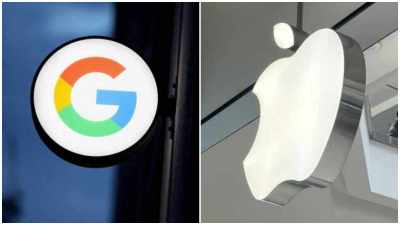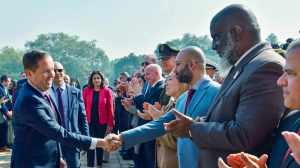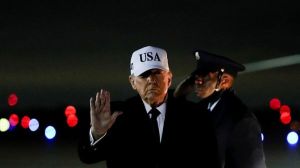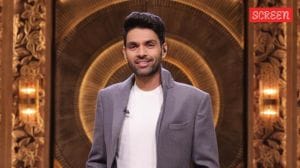Inside Track
Up to our gillsThanks to the ban by the Election Commission on pre-poll surveys, exit polls and publicity to candidates on election eve, the...

Up to our gills
Thanks to the ban by the Election Commission on pre-poll surveys, exit polls and publicity to candidates on election eve, the innumerable election-related TV talk shows have no option but to focus almost exclusively on Chief Election Commissioner M.S. Gill, during the unnaturally long gap between polling and counting.
Gill preened in his hour of glory as he scurried from one TV talk show to the next. In addition, TV viewers were subjected to frequent re-plays of a day in the life of Gill, where the CEC strutted around asking pointed questions to Bihar voters, 8220;Has any other CEC including Seshan visited your area?8221; On polling day, a Press Information Bureau official alerted all TV news channels and newspapers that they should get a camera shot of Gill casting his vote at the Tughlak Road polling booth as if he was the President of India.
Gill wanted the Railway Ministry to construct a broad-gauge rail track from his village to the nearest town. When the ministry protested that nonew projects could be undertaken during election time, Gill pressured Railway officials using the argument that since he was the CEC and not a candidate he was not covered by the model code.
To ensure that the spotlight remained exclusively on him, Gill was hesitant to delegate any major responsibility to other commission members. In the first round of polling, there were 26 deaths and considerable violence. Rather than doing any introspection on the EC8217;s inadequacies, Gill asked journalists to 8220;look at the overall picture8221; and described violence in certain pockets as 8220;routine things.8221; The height of his insensitivity was his declaring cheerfully that polling day was quite 8220;boring8221; for him!
Gill dandas
Meanwhile, another autocrat with the same surname who is the CEO of Prasar Bharati 8212; S.S. Gill 8212; has taken advantage of the absence of a functioning government to hastily announce that the Doordarshan and AIR news wings will be merged. Considering that the Prasar Bharati Board has not beenfully constituted yet and Prasar Bharati has yet to be ratified by Parliament, the indecent haste is most improper. The merger, after all, is a complicated affair, since the two organisations have separate staff, separate offices and administrative wings and have all along worked independent of each other.
Advance warning
R. Rajagopalan, bureau chief of the Telegu newspaper Vaarta, asserted on TV8217;s Newsnight programme that on February 4, the Intelligence Bureau IB at Delhi had alerted the Tamil Nadu State Government that there was a major security threat from a fundamentalist organisation to A.B. Vajpayee, L.K. Advani, Jayalalitha and Sonia Gandhi should they visit Coimbatore for election campaigning. Home Secretary B.P. Singh who was also on the show acknowledged the accuracy of this information.
If the BJP has stopped short of seeking the dismissal of the DMK over its gross negligence 8212; considering that it had been specifically tipped off by the Centre and a rice mill used formanufacturing ammunition had blown up in the region a few days earlier 8212; it is simply because its gaze is fixed on the post-poll scenario and it realises that today8217;s foes can be tomorrow8217;s allies!
Semi-final round
Unlike all other major players in this campaign, Sonia Gandhi is not constrained by possible post-poll alliances. She has rebuffed peace-making gestures by Harkishen Singh Surjeet and V.P. Singh and has even hit out directly at obvious potential allies like the Trinamool Congress and the TMC. The latter has meekly made clear its reverence for her.
Sonia can afford to do this since she does not plan to have an obvious stake in the next government. If it is a wobbly Congress-UF combine, she will keep her regal distance, confident that the present election is a semi-final. If it is a creaky BJP-led combine, that too, she presumes, will be equally short-lived. Only if the Congress and its allies cross the 220-mark would Sonia be directly involved in government formation. Sonia8217;s belief isthat no one apart from the Gandhis can provide India with a stable government and like the Bourbons believes that 8220;apres moi le deluge.8221;
Sorry, no thanks
At Sonia Gandhi8217;s huge rally on Delhi8217;s Ram Lila grounds, there were two daises. The upper dais for the Gandhi family and senior Congressmen, the lower one for lesser partymen. Delhi heavyweights Jagdish Tytler and Sajjan Kumar, who had mobilised a major chunk of the crowd along with another former MP, H.K.L. Bhagat, were seated with the aam janata even if in the front row. The three had been denied party tickets after Sonia8217;s apologies for the 1984 riots against Sikhs. During the long wait for Sonia, a local Congressman tried to make amends by appreciating the efforts of the former MPs, but half-way through his sentence, DPCC president Prem Singh grabbed the mike and stopped him short, yelling 8220;chup raho8221; shut up and ordered the qawaali singers to start.
- 01
- 02
- 03
- 04
- 05































